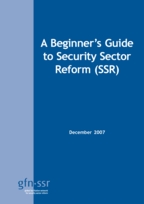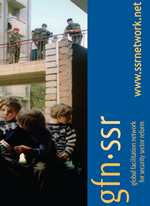Background
On 2 July 2008, the Latin American Faculty of Social Sciences (FLACSO-Chile), together with GFN-SSR, launched the English language edition of the Report on the Security Sector in Latin America and the Caribbean. This is a paradigmatic report that provides an in-depth comparison of the security sectors within Latin America and the Caribbean but has resonance far beyond the immediate region. The central objective of the report is to help understand the political and institutional security sector reform processes that occurred in the region after the return to democracy.
Presenters from FLACSO took care to describe the particular context within which SSR has and can take place, including the ongoing legacy of military rule and the impact of narcotics trafficking and transnational crime. Security is one of the most pressing problems in the region today, yet in many countries the institutions affiliated with the security sector have taken on roles beyond those originally assigned to them, with problematic consequences for accountability, legitimacy and public security. The report analyses and identifies the necessary conditions and reforms to strengthen civilian control of public security institutions. There are many difficulties in doing this, however, from the difficulty in obtaining accurate information on the security sector to the lack of engagement from civil society.
Brigadier (ret.) David Granger added to the discussion by providing a first-hand account of the far-reaching Security Sector Reform Action Plan in Guyana, while Catherine Weiss from the UK Security Sector Development Advisory Team spoke about the UK’s work in the Americas.
Speakers
-
Lucia Dammert
Director, Security and Citizenship Program, Faculty of Latin American Social Sciences (FLACSO), Chile; -
Claudio Fuentes
Director, Faculty of Latin American Social Sciences (FLACSO), Chile; -
David Granger
Brigadier (ret.)
Adjunct professor of National Security Affairs at the Center for Hemispheric Defense Studies of the National Defense University, Washington DC
Director of the Institute of Security and International Studies (Guyana) and former Commander of the Guyana Defence Force and National Security Adviser to the President; -
Catherine Weiss
Security Sector Development Advisory Team (SSDAT) Governance and Conflict Adviser; -
Robin Luckham
Professor, Institute of Development Studies (IDS) University of Sussex, chaired the event.
Report
The Latin American Context
Latin American and Caribbean (LAC) countries have been governed by military regimes for most of the twentieth century; indeed, democracies have been the system of government for only around 25 of the last 100 years, and this is critical to understanding the context for security sector reform in the region. Since the 1980s, most Latin American countries have made the transition to democracy yet democracy is a necessary but not sufficient condition for SSR. Civilian leadership and realistic policy alternatives demonstrating how to pursue reform and the importance of reforming the security sector are also essential. Governments often feel that SSR is less relevant and of lower priority compared to social concerns such as poverty, health and education. Meanwhile, the military often continues to play a significant role in political life. In the crafting of constitutions, for example, military power was often enshrined as a balance to civilian rule, and in many countries the military still enjoy a high degree of autonomy.
While the 1990s witnessed a decline in both interstate and intrastate conflict, crime – internal, regional, and transnational – rose significantly and poses a significant threat to public security. This environment of insecurity is frequently cited as one of the main concerns of the citizens in the region, and the security forces are consequently key political players.
There are a number of problematic trends in the region at the moment including:
- An expansion of the role of the military in internal affairs – a ‘police-isation’ of military forces has occurred in Colombia and Mexico, not least because of the violence employed by drug cartels;
- Weak civilian leadership and the political use of security institutions;
- Weak institutional settings for oversight;
- Uncoordinated reforms, generating overlapping capabilities.
In analysing both the potential for and the implementation of SSR in Latin America, it is necessary to diagnose some key issues within the security sector: Do civilians have a role to play? To what extent do parliamentarians have oversight over the main security institutions? Is the government able to control the military in reality? What level of accountability is there? The report has collated and analysed information in an attempt to address these questions while attempting to draw comparisons from across the continent, as very little comparative analysis of the region’s security sectors has taken place to date.
The Project
The project was in partnership with the Organisation of American States (OAS), Georgetown University, and the governments of Chile and Mexico. It provides an institutional comparative analysis of the military, police and intelligence services in particular as a number of other institutions are investigating the justice sector. Experts in countries across the region (excluding Haiti, Cuba and Venezuela) wrote national reports that were combined in 2007 to create a regional report. Crucially the report was designed not to be an academic text but instead to be used as a tool to change security sector policies. There has been
Research into the security sector throughout the region is incredibly difficult and poses many challenges: There is little expertise across subfields and a lack of regional and sub-regional comparative perspectives; these problems are exacerbated by the limited availability of accurate empirical information that official sources are often reluctant or unable to provide. This makes it difficult, for example, to discuss a rise in police numbers and analyse the effects when the exact numbers of police officers cannot be confirmed. Moreover, both sides of the equation demonstrate a lack of interest in the subject – there is limited civil society involvement in security issues except for human rights, while political support for thorough analysis and reform is weak.
Further outputs continuing a region-wide perspective are to follow over the next year including reports on the prison system, confidence measures and police disciplinary systems (see below).
Key Findings
Defence
- The armed forces have a wide range of roles – these range from policemen to firemen to social workers (including education and natural disasters);
- Parliamentary defence committees are not the norm but the exception, and few have permanent staff in parliament;
- Most defence ministries lack an auditing and evaluation unit;
- In only three countries is expenditure defined by law and in only two is the budget publicised within the defence ministry;
- Democratic civilian leadership is improving but it varies across sub-regions – it is highest among the Andean countries;
- While some reforms have been implemented, they have not always been a success.
Public Security
- Police act as civil defence officers, often working against social disorder than against crime;
- Police-military areas of intervention often overlap:
- It is often unclear who has command and in which strategy – for example, in Mexico both the police and the army are involved in counternarcotics operations;
- Police officers also work as private security:
- Officers clock off and work privately but often keep their weapon and badges – this raises worrying issues of accountability if and when a serious incident occurs;
- This practice is permitted in eight countries and forbidden in another eight;
- Weak reforms have occurred with limited results:
- Central American countries have undergone relatively more reforms than their Caribbean and southern counterparts;
- Of the reforms that have taken place, many have concentrated on training and rank structure within the police forces.
Intelligence
- There is a lack of knowledge amongst non-government and even government actors;
- A legal framework for the intelligence sector is missing:
- In many countries, intelligence regulations do not exist while in others, those regulations that do exist do not refer to control of the sector;
- Coordination is weak:
- In several countries, there is no official body that coordinates or controls the work and/or information of the different agencies;
- Oversight takes place ‘in the newspapers’.
Guyana
The experience of Guyana to date is one that emphasises the value of SSR and that has the potential to be a valuable success.
When Manuel Noriega was removed from power in Panama in 1989, the narcotics trade fragmented, spreading throughout Latin America including Guyana. Trafficking in people and arms, in addition to cocaine, was well organised and became increasingly violent. In Guyana, police squads were used as enforcers for gangs but their position did not prevent them from being subject to violent retaliation.
The first response to the escalating violence and the involvement of law enforcement officers was an attempt to reform the police using local measures. These, however, were palliative and led to the introduction of new ‘special squads’ rather than an attempt to tackle the underlying social problems. As a result, the UK government became involved and DfID commissioned a report in 2000 which centred on: helping the force’s senior management determine the functions of an accountable, professional force; the development of a community-based policing style; and assistance for the government to identify the areas to strengthen performance, accountability and community orientation of the force. These recommendations, however, were largely ignored and the situation deteriorated.
In 2003, the UK Defence Advisory Team (now SSDAT) arrived, in response to an invitation from the government of Guyana. Their report recommended enhancing the police and closing down the special squads, but the report had limited impact within the Caribbean nation. There was also an indigenous attempt at improvement – a Task Force on Organisation Change – that originated from a group of frustrated policemen who decided to make use of the recommendations from earlier reports. However, this initiative failed after these police officers were assigned to other crime-fighting responsibilities.
In 2005, Baroness Amos, the former UK Parliamentary Under-Secretary for Foreign and Commonwealth Affairs, met the President Jagdeo of Guyana and in 2006 agreed to a Statement of Principles. The African Security Sector Network (ASSN), led by Professor Eboe Hutchful, became involved and integrated various local and foreign initiatives into a holistic strategy. On this basis, the Guyana and UK governments agreed upon a Memorandum of Understanding for a Security Sector Reform Action Plan. This included plans to strengthen the operational capacity of the police force, the creation of significant parliamentary oversight of the security sector and increasing public participation on security issues.
As of 2007, security sector reform has been growing slowly but surely. The National Assembly has been brought back into the picture so SSR is no longer solely an executive matter. The intention is that security sector reform in Guyana must eventually go far beyond the police force’s short-term needs and lay the foundation for a safe, secure and more humane society. While the path has been rocky, firm foundations have now been laid and Guyana provides a possible model for other Caribbean states.
UK Americas Strategy
The UK Americas Strategy, while limited compared to other regions such as Africa, has as a focus reform of the security sectors within the priority countries of Colombia and Bolivia. The UK concentrates on building key networks within and outside the region and between civil society and police, among other organisations, and promotes donor coordination and local ownership.
Turning to the report, Catherine Weiss noted that it will play an important role in strengthening the concept of SSR in the region and will help to promote a regional, sectoral and comparative approach. The report analyses the relationships between the military, police (in many countries within the region, the role of the military and police is blurred at best, particularly in Colombia), legislature and executive. It stresses the importance of checks and balances, legitimacy, civilian oversight and transparency.
Discussion
A lively and engaging discussion followed the main presentations, reinforcing and expanding upon some of the main conclusions of the report. Evidence-based policy-making is of critical importance in the field of SSR and this report provides much-needed evidence. The report and the process underpinning it is a model that other regions could follow, particularly those that also have a history of authoritarian rule.
FLACSO initially focused on constitutional issues, which were easier to measure, rather than on the performance component of the police and army in practice. Statistics on performance and numbers vary from day to day, even when originating from the same source. However, participants suggested, and the researchers agreed, that it will be important to see if, and why, police performance changes for better or for worse in the future.
Governments often adopt the simplistic approach that crime prevention is achieved by putting (more) police on the streets. Yet while there has often been investment in new technology, the same is not true of investment in people that make up the police force, for instance in terms of recruitment and training. Accurate evidence on police performance will be crucial in pushing for improvements in police training at the policy level.
One feature particular to Latin America and the Caribbean is the cocaine trade, which has had a damaging impact on the region’s security sectors. The narcotics trade has played a major role in the collapse of the police and justice system, in terms of fuelling corruption but also through shifting the focus of the police (and in many cases the military) towards counter-narcotics, clouding responsibilities and creating concerns over accountability.
Another important aspect of Latin America security is the role of private security. Within the private security industry, ‘police officers by day, guards by night’ is a growing trend. While this is not always legal, it is often tacitly accepted by governments acknowledging the low salaries paid to police officers. In Argentina, nightclub owners sometimes pay the police service ‘informally’to send police officers to protect their establishments.
Local ownership, frequently cited as a key component of SSR, raises some problematic issues in the Latin American context, such as who exactly the owners are. There is often no civil society involvement in security issues, while the combination of a strong military and weak civilian administration could lead to problems if it is the military that takes ownership. Meanwhile, the use of Western or non-native consultants to draw up and present reports to government can be problematic and may reduce the likelihood of implementation. The use of a local organisation alongside or instead of a Western one may increase the chances of progress on reform.
Converting research evidence into policy changes in the region requires a multi-prong approach. In Latin America, security is not a public policy like education’ instead it is thought of in political terms because the police and military are both political actors. The media also often play a highly political role – many media owners were formerly members of the government or may have aspirations for political office, or are often owners of private security firms. To put policy into practice, it is necessary to know how to play the political game. FLACSO presenters suggested:
- Involving actors that are more policy-focused such as the OAS;
- Push for reform at government level;
- Engage NGOs in individual countries as advocates for change, following the example of Viva Rio in Brazil.
Further Reports
Stage II (published in June 2008) (available in Spanish here)
- Building confidence measures? A comparative analysis.
- Blind policies? Challenges of criminal statistics
- Police disciplinary systems
Stage III (to be published by March 2009)
- Penal populism in Latin America
- Crisis of the prison system
- Challenges of the privatisation of security
- The nuclear debate in Latin America
Stage IV
- Two regional reports will be published
- A cross regional comparative perspective to be published as part of the Global Consortium









